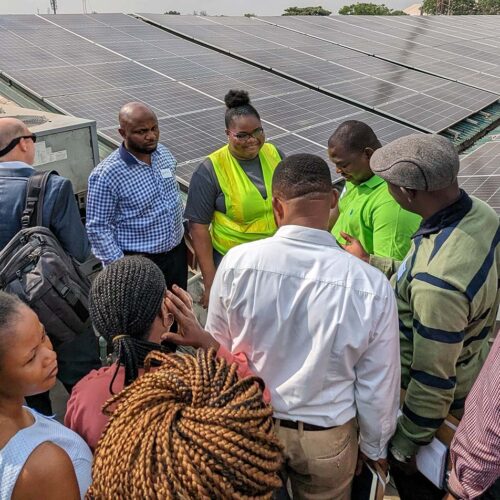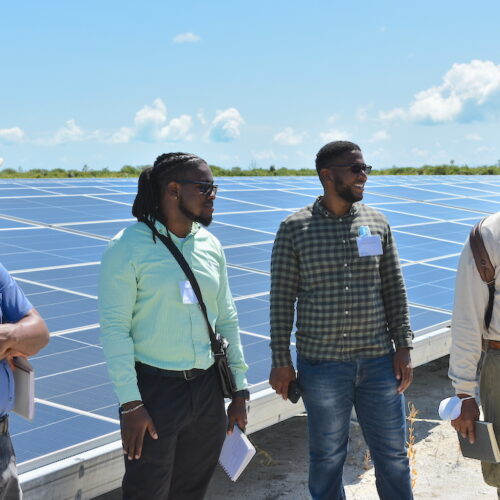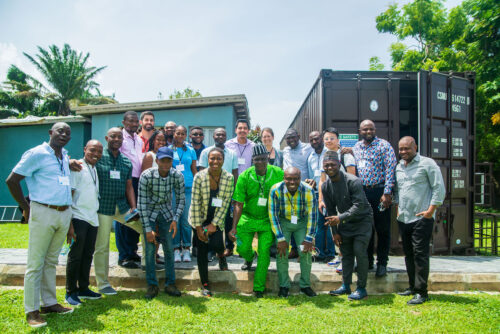
A Collective Effort to Increase Energy Access in Nigeria
RMI’s Energy Transition Academy is bringing Nigeria’s energy leaders together to ensure the workforce is prepared for the energy transition.
The night before meeting with utility professionals, project developers, and financiers in Epe, Nigeria, we walked into our hotel rooms and flipped the light switch. No lights turned on. Confused, we plugged in our phones to charge them, but that didn’t seem to work either. Sitting in the darkness, phone screens illuminated the room as messages came through, “Welcome to Nigeria!” a Nigerian colleague texted. “Wish I had brought a candle or lantern along,” another person joked. It turns out that a power outage had swept across Epe. The blackout like the one we experienced is a daily experience for the 60 percent of Nigerians that have access to electricity. More drastically, however, is complete grid collapse that for the past decade, has happened over 200 times. While blackouts are a major inconvenience, it created a perfect introduction to why we were all in Epe in the first place; the need to increase reliable electricity supply to the Nigerian grid.
This was the night before RMI’s Leadership Accelerator, a customized, workshop-style gathering designed to drive rapid learning and build decision-making skills to advance clean energy. This particular engagement concluded the Energy Transition Academy’s (ETA’s) six-month Global Fellowship Program’s Nigeria cohort, developed and implemented with the Lagos Energy Academy.
Africa’s biggest economy experiences blackouts quite frequently due to insufficient electricity generation and grid constraints that lead households and businesses to rely largely on diesel and gas generators. The irony about this situation was that in the midst of the power outage, 51 key stakeholders from the Nigerian energy sector were convening to discuss solutions where utilities (known as distribution companies or DisCos) and other stakeholders can work together to advance utility-enabled distributed energy resource (DER) projects as one of several pathways to increase energy access and improve grid reliability. Addressing this challenge, which impacts almost 90 million Nigerians — about 43 percent of the population — would diminish the number of power cuts and promote economic productivity and prosperity.
Participants in the Leadership Accelerator shared lessons learned from the first interconnected 1 MW minigrid in Nigeria, Wuse Market in Abuja, through an interactive session to collectively troubleshoot common challenges faced during project development and implementation. Experts presented insights on different DER business models, which was followed by a fireside chat with investors and financiers to discuss derisking considerations on DER projects for financial investment.
Complementing these sessions, stakeholders also heard from the cohort of fellows that had been working on DER projects to help advance both strategies and renewable energy project development for their DisCos.
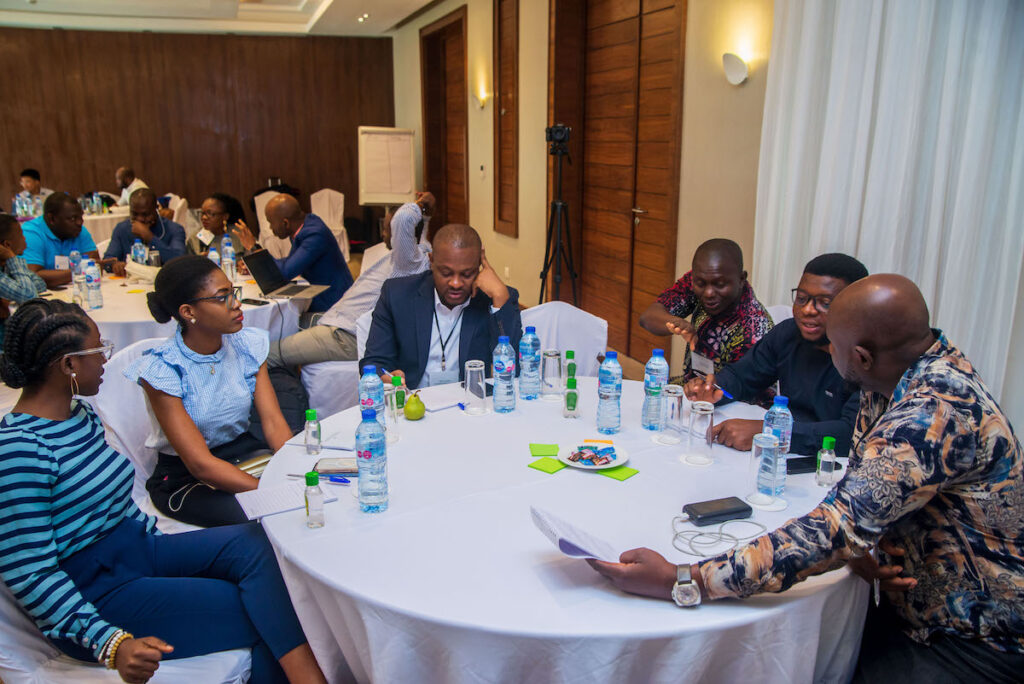
The fellows, representing four DisCos across Nigeria — Abuja Electricity Distribution Company (AEDC), Ibadan Electricity Distribution Company (IBEDC), Eko Electricity Distribution Company (EKEDC), and Ikeja Electric (IE) — were selected as part of the cohort of twenty energy professionals participating in an intensive training focused on project development and management for solar-plus-storage minigrids. As a culmination of their hard work during the Fellowship, the fellows presented and pitched their Capstone Projects — a core component of the Global Fellowship Program with the purpose of scaling DER projects.
From Idea to Implementation
The fellows developed 14 Capstone Projects over the past six months with the support of expert coaching from Lagos Energy Academy and ETA’s Ask an Expert service, and providing one another peer feedback. The result led to a diverse range of Capstone Project topics touching on multiple facets of the DER development processes and strategies and highlighting the benefit from multistakeholder collaboration, which could potentially create jobs in the long-term, and community impact through project implementation.
With DisCo executives in the room for the fellows’ Capstone Project showcase, along with other stakeholders, the room collectively brainstormed how to support implementation. After some fellows from IE presented on their toolkit to provide clarity on the process for executing successful DER deployment, an executive from a different DisCo committed to quickly adopting it. The team aims to share the toolkit among different DisCos to facilitate resource sharing.
Plotting actionable solutions to advance DER development across a DisCo is a key step for the practitioners. However, broader action is needed from management to usher in a significant change and new way of doing business. As many of the DisCos sent a representative to the Leadership Accelerator, it not only empowered the fellows, but also signaled that their respective organizations were committed to realizing DER project development.
“Before the fellowship started, there was so much back and forth between the DisCo and developers because DERs were very new, something we didn’t fully understand,” said Obianuju Ukwueze, head of business development for Ikeja Electric. “The insights from the fellowship have led to a lot of impact. Projects that were kicked off in 2018 have progressed because we now understand what we are meant to do.”
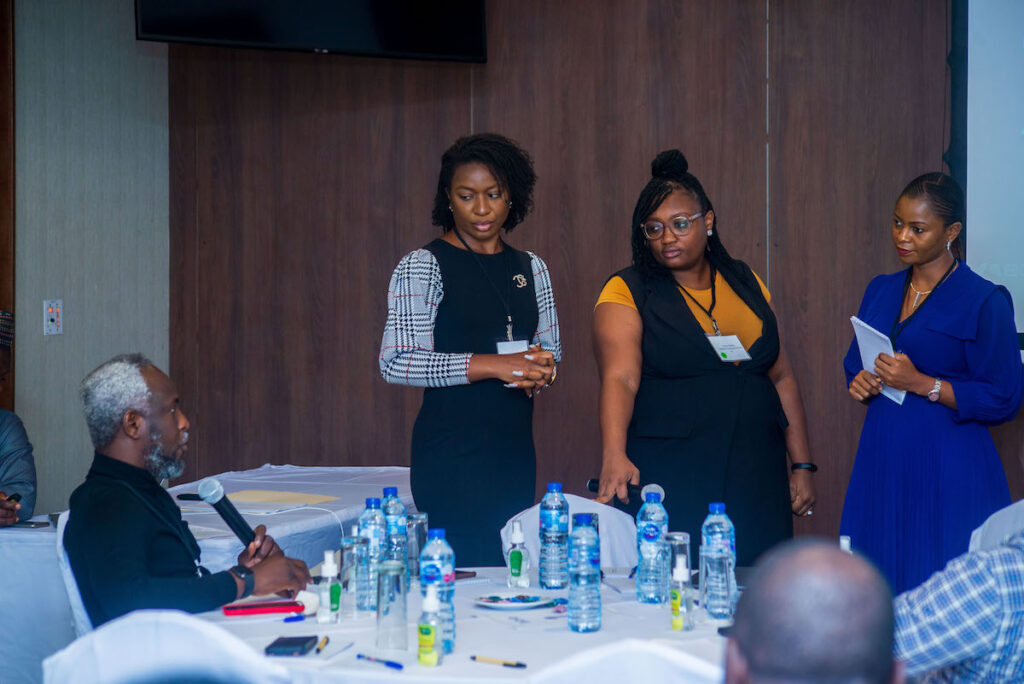
Highlights of Capstone Projects included:
- Benchmarking Study of Investment Costs for Utility-led DERs: This project, created by Omosede Imohe, DER team lead at AEDC, provides insights into the investment costs for minigrids to address the financial knowledge gap of DisCos. The information has been collated from AEDC’s experience in implementing a procurement process for three pilot utility-enabled DER projects, including commercial street, rural community, and commercial and industrial projects. “As AEDC continues to implement DER projects, the benchmark data will be updated regularly to ensure that the data remains relevant,” says Imohe. “Furthermore, the benchmark study will be a key decision-making tool for AEDC while collaborating with developers on utility-led DERs.”
- Leveraging DERs to Transform Ota, Ogun State, into A 24/7 City – Project Funding Strategies: Opeoluwa Afolabi from IBEDC addresses the funding barrier in the adoption of DERs by looking at different funding opportunities for the franchise area of Ota city. “I intend to leverage the knowledge and deeper understanding I have gained while working on my Capstone project to guide and encourage my company’s management team to source funds to finance DER projects through strategic partnership with financiers, developers, and other stakeholders,” says Afolabi. “Hopefully, the success achieved from such partnerships will encourage the company to aggressively scale up DER projects.”
- A Guide to a Successful Interconnected Minigrid Project for DisCos: This team, led by fellows from IE, offers practical recommendations to facilitate the successful implementation of interconnected minigrid projects. “The next step is to ensure the adoption of the toolkit as a training resource within IE and as a valuable reference for project execution by DisCo stakeholders and developers,” says Fatima Haliru, power purchase lead from IE. “Secondly, by utilizing the toolkit, the aim is to facilitate expedited project completion by streamlining processes and requirements, leading to efficient and swift turnarounds.”
- Improving Stakeholders’ Buy-in for Minigrid Solutions in DisCos: This project, championed by Onafuye Odunayo, change management lead at AEDC, focuses on the people side of DER projects — ensuring DER projects are effectively adopted in DisCos. “My understanding of DERs is that it is a different or new way of doing business for DisCos, and like every new initiative there is a change component which is largely dependant on people,” says Odunayo. “I spoke with four developers to further understand how they have deployed Communication and Resistance Management Plans. To implement the learnings from the Fellowship and the Capstone Project I have fully joined the DER team.”
Creating a Conducive Energy Sector Ecosystem
Nigeria committed to carbon neutrality through its Energy Transition Plan in an effort to limit the intensity of climate change and to reap the associated socioeconomic impacts such as job creation, reduced pollution, economic growth, a just energy transition, equity, and inclusion. To achieve its plan, Nigeria seeks to add 197 GW of new installed solar capacity by 2050, which will not only require training utility professionals to develop and implement projects but will also require coordination among other players in the broader energy sector such as solar minigrid project developers, clean energy financiers, and regulators.
Bringing together energy sector-enablers during the Leadership Accelerator helped foster a better understanding of each other’s perspectives and roles in the energy transition. Both the Fellowship and the culmination of the Leadership Accelerator created a unique opportunity for participants to collectively brainstorm solutions to their problems and work on real-world projects together.
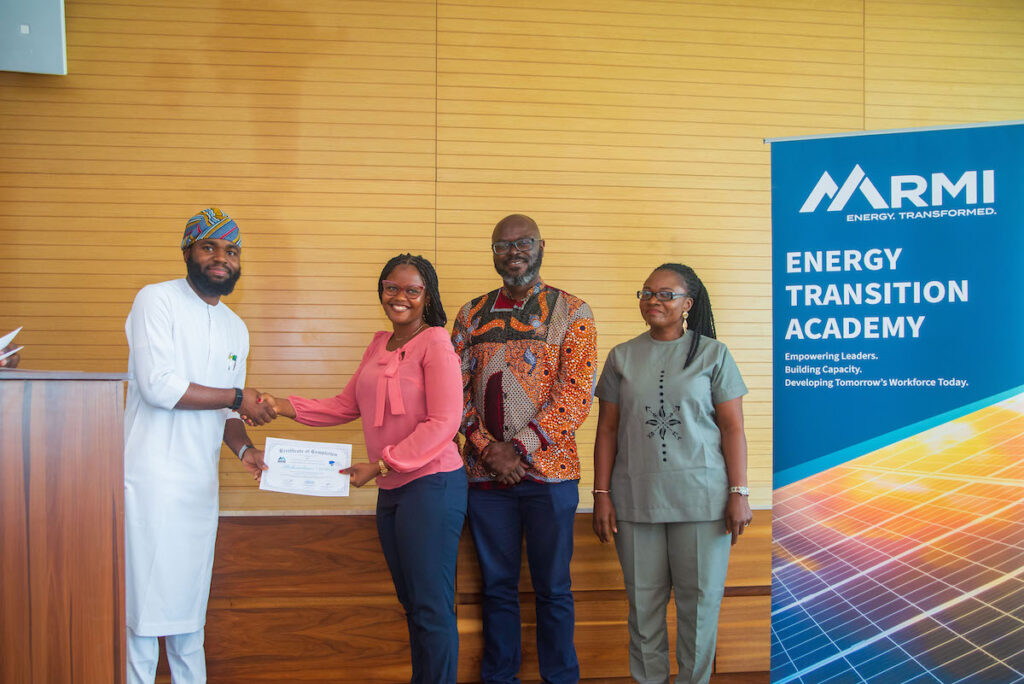
“RMI has been able to foster collaboration to promote renewable energy development. I hope the program continues so we continue fostering collaboration, not just in Nigeria but globally,” said Iroghama Osamwanze, ETA fellow and technical assistant to the CEO at Eko Electricity Distribution Company.
No one individual, organization, or stakeholder will be able to achieve their goals to increase energy access and develop renewable energy alone. Providing affordable, reliable, clean energy and boosting economic growth and development in Nigeria, and globally, requires a collective effort. Connecting the wider ecosystem to collaborate and advance the work together will radically accelerate the energy transition, and the Global Fellowship Program and Leadership Accelerator are just one step in this direction.
